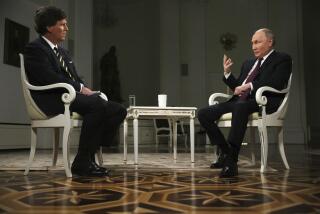Truth About Stalin to Come--Sakharov : Dissident Says Gorbachev Could Have Disclosed More
MOSCOW — Nobel Peace Laureate Andrei D. Sakharov, in an unprecedented interview published in the weekly Moscow News today, said “the whole terrible truth” about the rule of Josef Stalin remained to be told.
Sakharov, for almost two decades spiritual leader of the Soviet dissident movement, hailed Stalin’s successor, Nikita S. Khrushchev, as an “outstanding world leader” and appealed for an end to “half-truth and suppression” in treatment of history.
The interview, conducted three days before Soviet leader Mikhail S. Gorbachev’s speech Monday touching on the Stalin period, contained new revelations for Soviet readers on their past.
It was the first time any extensive statement by Sakharov, a top nuclear physicist in the 1970s who was denounced as a traitor, had appeared in the central Soviet press.
Exiled to Gorky
Sakharov was exiled to the city of Gorky in 1979 but was allowed with his wife, Yelena Bonner, to return to Moscow last December on Gorbachev’s personal intervention.
Sakharov said in a telephone interview today that he was “very happy” the Moscow News piece had been published. “I regard this as another demonstration of glasnost, “ he said.
“In his speech, Gorbachev did not tell all the truth that should have been told about the 1930s and 1940s,” Sakharov added, echoing the opinion of many Sovietologists. “Not everything satisfied me. I would have expected, and I hoped for, more.”
But he said he had been encouraged by the Kremlin chief’s announcement that a commission will investigate the extent of repression under Stalin.
In his speech marking the 70th anniversary of the 1917 Bolshevik Revolution, Gorbachev said Stalin was guilty of “wholesale repressive measures and acts of lawlessness.”
But he also praised Stalin’s “incontestable contribution to the struggle for socialism” and his wartime leadership of the country.
Gorbachev said Stalin’s victims were in the “thousands”--a figure widely at odds with a death toll calculated by Western historians at several millions and well below unofficial estimates by some Soviet writers.
In the Moscow News interview, Sakharov spoke of Soviet espionage against the U.S. nuclear weapons program during World War II.
Discussing what for four decades has been a total taboo in Soviet history writing, he revealed for Soviet readers that German-born scientist Klaus Fuchs “transmitted to the U.S.S.R. both during and after the war highly important atomic secrets out of ideological conviction.”
Sakharov criticized a recent documentary shown on Moscow television which omitted any reference to the Fuchs case in dealing with the execution of Ethel and Julius Rosenberg in the United States in 1953 for allegedly spying for Moscow.
“If we talk about that, then we cannot suppress the fact that the execution of the Rosenbergs was the revenge of U.S. counterintelligence for the Klaus Fuchs affair,” he said.
More to Read
Sign up for Essential California
The most important California stories and recommendations in your inbox every morning.
You may occasionally receive promotional content from the Los Angeles Times.










